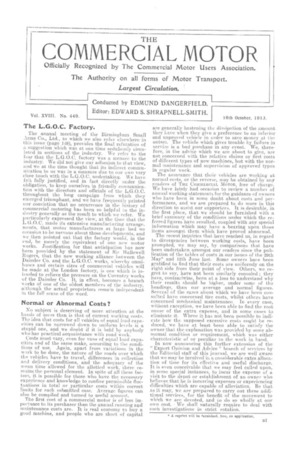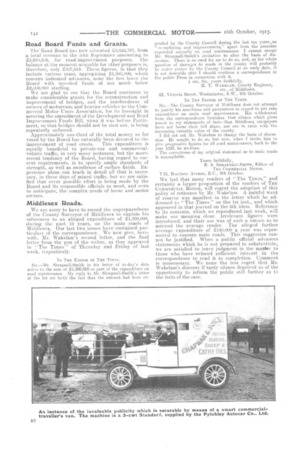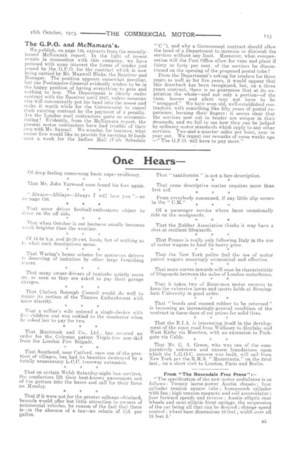The L.G.O.C. Factory.
Page 1

Page 2

Page 3

If you've noticed an error in this article please click here to report it so we can fix it.
The annual meeting of the Birmingham Small Arms Co., Ltd., to which we also refer elsewhere in this issue. (page 149), provides the final refutation of a suggestion which was at one time sedulously circulated in sections of the industry. We refer to the fear that the L.G.O.C. factory was amenace to the industry. We did not give our adhesion to that view, and we at the time thought that its indirect communication to us was in a measure due to our own very close touch with the L.G.O.C. undertaking. We have felt fully justified, and in fact directly under the obligation, to keep ourselves in friendly communication with the directors and officials of the L.G.O.C. throughout the long campaign from which they emerged triumphant, and we have frequently printed our conviction that no occurrence in the history of commercial motoring has been so helpful to the industry generally as the result to which we refer. We particularly expressed the view, at the time that the L.G.O.C, made its extensive manufacturing arrange_ ments, that motor manufacturers at, large had no occasion to be nervous about those developments, and we then pointed out that the factory would, in the end, be merely the equivalent of one new motor works. Justification for that anticipation has now been provided by the statement of Sir Hallewell Rogers, that the new working alliance between the Daimler Co. and the L.G.O.C. works, whereby omnie buses and certain sizes Of commercial vehicles will be made at the London factory, is one which is intended to relieve the pressure on the Coventry works of the Daimler Co. It, in effect, becomes a branch works of one of the oldest members of the industry, although the actual proprietors remain independent in the full sense of the word.
Normal or Abnormal Costs ?
No subject is deserving of more attention at the bands of users than is that of current working costs. The idea that costs for all vehicles of equal load capacities can be narrowed down to uniform levels is a stupid one, and we doubt if it is held by anybody who has practical .acquaintance with road work.
Costs must vary, even for vans of equal Toad capacities and of the same make, according to the conditions of use. Again, apart from variations in the work to be done, the nature of the roads over which the vehicles have to travel, differences in collection and delivery conditions, and the adequacy of the mean time allowed for the allotted work, there remains the personal element. In spite of all these factom, it is possible for those who have the necessary experience and knowledge to confine permissible fluctuations in total or particular costs within correct limits for each submitted ease. Average figures can also be compiled and turned to useful account..
The first cost of a commercial motor is of less importance to its purchaser than the annual running and maintenance costs are. It is real economy to buy a good machine, and people who are short of capital
are generally hastening the dissipation of the amount they have when they give a preference to an inferior and unproved vehicle in order to save money. at the outset. The vehicle which gives trouble by failure in service is a bad purchase in any event. We, therefore, in the advice which we are about to give, are not concerned with the relative claims or first costs of different types of new machines, but with the normal maintenance and supervision of approved types in regular work. The assurance that their vehicles are working at normal costs, or the reverse, may be obtained by any readers of THE Comm:cam, MoTon, free of charge. We have lately had occasion to review a number of annual working statements for the guidance of owners who have been in sonic doubt about costs and performances, and we are prepared to do more in this direction to assist our supporters. It is desirable, in the first place, that we should be furnished with a brief summary of the conditions under which the referred figures have resulted, coupled with any special information which may have a bearing upon those items amongst them which have proved abnormal. The recent inquiries that have reached us, in regard to divergencies between working costs, have been prompted, we may say, by comparisons that have been undertaken amongst our readers since the publication of the tables of costs in our issues of the 29th May* and 12th June last. Some owners hawe been gratified to find that their costs are uniformly on the right side from their point of view. Others, we regret to say, have not been similarly consoled ; they have, contrariwise, been at a. loss to understand why their results should be higher, under some of the headings, than our average and normal figures. Several of the cases about which we have been consulted have, concerned tire costs, whilst others have concerned mechanical maintenance. In every ca-se, without exception, we have been able to find the root cause of the extra expense, and in some eases to eliminate it. Where it has not been possible to indicate how the supposed excessive costs might be reduced, we have at least been able to satisfy the owner that the explanation was provided by some abnormal condition or requirement, which was either characteristic or or peculiar to the work in band. In now announcing this further extension of the "Expert Opinion and Advice" branch of services by the Editorial staff of this journal, we are well aware that we may be involved ir a considerable extra allocation of time for its effective and useful discharge. It is even conceivable that we may feel called upon, in some special instances, to incur the expense of a, visit to the depot or establishment of an owner who believes that he is incurring expenses or experiencing difficulties which are capable of alleviation. Be that as it may, we are prepared to carry out these additional services, for the benefit of the movement to which we are devoted, and to do so wholly at our own cost. We shall naturally require to deal with such investigations • in strict rotation.
Road Board Funds and Grants.
The Road Board has now allocated X3,622,787, from a total revenue to the 3Jith September amounting to X:3,930,606, for road-improvement purposes. The balance at the moment avanable for other purposes is, therefore, only £307,819. These figures, in that they include various sums, aggregating X1,593,806, which concern indicated advances, none the less leave the Board with invested funds of not much below £2,000,000 sterling.
We are glad to see that the Board continues to make considerable grants for the reconstruction and improvement of bridges, and the indebtedness of owners of motorvans and heavier vehicles to the Commercial Motor Users Association, for its foresight in securing the amendment of the Uevelopment and Road Improvement Funds Bill, when it was before Parliament, so that bridges should not be shut out, is being repeatedly enforced.
Approximately one-third of the total money so far voted by the Board has naturally been devoted to the improvement of road crusts. This expenditure is equally beneficial to private-car and commercialvehicle traffic, in very many instances, but the morerecent tendency of the Board, having regard to current requirements, is to specify ample standards of strength, as well as excellence of surface finish. Experience alone can teach in detail all that is necessary, in these days of mixed traffic, but we are satisfied that every possible effort is being made by the Board and its responsible officials to meet, and even to anticipate, the complex needs of horse and motor owners.
Middlesex Roads.
We are sorry to have to record the unpreparedness of the County Surveyor of Middlesex to explain his references to an alleged expenditure of £1,900,000, during the past 10 years, on thc main roads of Middlesex. Our last two issues have contained particulars of the correspondence. We now give, herewith, Mr. Wakelam's second letter, and the final letter from the pen of the writer, as they appeared in "The Times" of Thursday and Friday of last week, respectively.
To THE ED/TOR OF THE TIMES'.
Sir,—Mr. Shrapnell-Smith in his letter of to-day's date refers to the sum of £1,200,000 as part of the expenditure on road maintenance. My reply to Mr. Shrapnell-Smith's letter of the 1st set forth the fact that the amount had been ex pendcd by the County Council during the last ten years on " re-surfacing and improvements," apart from the amounts expended annually on road maintenance. I cannot accept Mr. Shraptiell-Smith's invitation to alter the basis of discussion. There is no need for me to do so, and, as the whole question of damages to roads in the county will probably be under review by the County Council at an early date, it is not desirable that I should continue a correspondence in the public Press in connection with it. I am, Sir, yours faithfully, H. T. WAKELAM, County Engineer, etc., of Middlesex.
63, Victoria Street, Westminster, S.W., 8th October.
To TBE EDITOR OF Tax TIMES.
Sir,—The County Surveyor of Middlesex does not attempt to justify his assertions and pretensions in regard to pro rata expenditure on main road maintenance. His withdrawal from the correspondence furnishes that silence which gives assent to my statements of fact—that Middlesex ratepayers have not borne their full share, nor one in ratio with the increasing rateable value of the county.
I did not ask Mr, Wakelam to change the basis of discussion. He sought to do so, but now, when I invite him to give progressive figures for all road maintenance, back to the year 1889, he declines.
The correctness of my original statement as to main roads is unassailable.
Yours faithfully, E. S. SIIIIA.PNELL-SMITH, Editor of THE COMMERCIAL MOTOR.
7-15, Rusebery Avenue, E.C., 9th October.
We feel that many readers of "The Times," and certainly a larger proportion of the readers of THE COMMERCIAL MOTOR, will regret the adoption of this policy of reticence by Mr. Wakelam. A painful want of reserve was manifest in the letter which he addressed to "The Times " on the 1st inst., and which appeared in that journal on the 6th idem. Reference to its contents, which we reproduced last week, will make our meaning clear. Irrelevant figures were introduced, and their use was of such a nature as to mislead the average reader. The alleged further average expenditure of £120,000 a year was represented to concern main roads. This suggestion cannot he justified. When a public official advances statements which he is not prepared to substantiate, we are satisfied to leave judgment in the matter to those who have evinced sufficient interest in the correspondence to read it to completion. Comment is unnecessary. We none the less regret. that Mr. lArakelam's discreet if tardy silence deprived us of the opportunity to inform the public still further as to the facts of the case.
The G.P.O. and McNamara's.
We publish, on page 148, extracts front the recentlyissued McNamara report. In the light of recent events in connection with this company, we have perused with some interest the forms or tender just issued by the O.P.O. for the contract which is now being carried by Mr. Maxwell Hicks, the Receiver and Manager. The position appears somewhat peculiar, but the Postmaster-General evidently wishes to be in the happy position of having everything to gain and nothing to lose. The Department is clearly under contract with the Receiver until 1917, unless someone else will conveniently put his head into the noose and make it worth while for the Government to cancel t heir existing contract by the payment of a penalty. Are the London mail contractors quite so accommodating? Evidently, from the McNamara report, the present motor contractors have had trouble of their own with Mr. Samuel. We wonder, for instance, what motor firm would like to provide for carrying 50 loads once a week for the Indian Mail (Vide Schedule " 0"), and why a Government contract should allow the head of a Department to increase or diminish the services without any limit. Moreover, what compensation will the Post Office allow for vans and plant if thirty or forty per cent. of the services be discontinued on the opening of the proposed postal tube ?
From the Department's asking for tenders for three years as well as for five years, it would appear that this drawback has been recognized, but., on a three years contract, thece is no guarantee that at its expiration the whole—and not only a portion—of the vans, horses and plant may not have to be "scrapped." We have seen old, well-established contractors, with something like fifty years of postal experience, burning their fingers : it seems clear that the services now out to tender are unique • in their demands, and we fail to see how they can be judged by ordinary motor standards which apply to any other services. Two-and-a-quarter miles per hour, year in year out. We repeat our remarks of some weeks ago —" The G.P.O. will have to pay more."




















